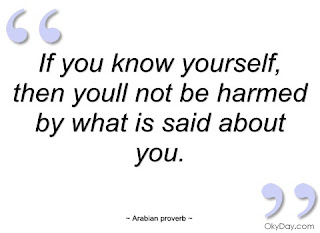We can only judge actions. Trying to fathom intentions behind the action is always just about making a guess or making assumptions.
One of the problems with labels based on assumptions occurs when we take them one step further and use these assumptions to
justify actions taken or to explain actions experienced. Neither is helpful beyond a certain point because they are based on conjecture without fact, suppositions without knowledge.
The challenges with such justifications and explanations are that they
are simply a hypotheses based on what we think we know.
A world wide problem is that our whole way of communication is
structured around judgmental-ism and accusations. We tend to talk in terms of who did what to
whom, or who did what to me and try to explain it in terms of judgmental
expressions.
I am researching another area lately; looking at "what needs
are not being met". This is a fascinating
way of approaching human relationships.
When someone acts in a way that we perceive as being without empathy, I
am now choosing to ask; "what needs have not been met for this person to treat others this
way?"
Are there answers from this point of view? I don't know, because this is a new concept / point of view for me. However it would seem to be a healthier way, for me at least, to view
the actions of others as coming from a place of lack, a lashing out because of
an unmet emotional need.
I think if I had a do over I would ask my estranged daughter; “what
emotional need have I not been able to fulfill for you in the past and how can
I fulfill that need now”?
Would that open up dialogue? I really do not know.
What I do know is that explaining, apologizing, begging etc.
did not work.
Anger and blaming also have not helped me in my own healing journey. Can I extrapolate that to mean that her anger and blaming me is not helping her to heal either?
Self-compassion is a way of looking at myself that is helping me to heal.
Does that mean that compassion toward estranging offspring is a viable
path on the road to acceptance or even reconciliation? I do not know the answer but I am willing to struggle with this different perspective and allow time to show me the possibilities.
Trying to justify and explain away the behaviour; the action of rejecting, distancing, non communication and abandoning does give me a sense of closure yes. But does it heal?
That is the question that I am facing right now in my own personal healing journey. In trying to find my path forward I have to move beyond closure to a new perspective, a different outlook based on what I am learning about myself, human interactions, relationships.
Where previously I wanted to understood from the view point of making a judgement and finding an explanation, I now want to go beyond into a new frontier. I want to look at what was / is missing that gives rise to a person exhibiting certain personality and character behaviours.
I especially want to discover the correlation between what my personal "unmet needs are" and my responses to certain actions.
I hope that in doing, so I will offer myself the opportunity to gain a better understanding of myself. And my hope is that in getting to understand myself better, I will also be better able to see similar co-relationships in others when they act badly towards me.
- To be able to see beyond the action and the judgement to unmet need causality.
- To discover if there is indeed a relationship between unmet needs, internal pain and actions that cause pain towards others.
Renate Dundys Marrello
2016 - 06 - 21
Link to my Facebook Reflections Page
photo credit - as marked or unknown
My journal blog entries are copyright.
I love when you share my page to spread the word.
If you want to quote me I kindly ask that you please provide a link back to my page.
Link to my Facebook Reflections Page
photo credit - as marked or unknown
My journal blog entries are copyright.
I love when you share my page to spread the word.
If you want to quote me I kindly ask that you please provide a link back to my page.









